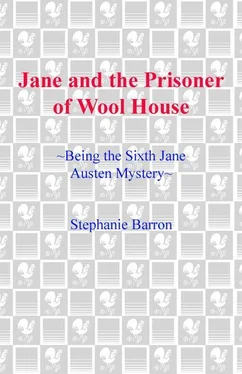Stephanie Barron - Jane and the Prisoner of Wool House
Здесь есть возможность читать онлайн «Stephanie Barron - Jane and the Prisoner of Wool House» весь текст электронной книги совершенно бесплатно (целиком полную версию без сокращений). В некоторых случаях можно слушать аудио, скачать через торрент в формате fb2 и присутствует краткое содержание. Жанр: Исторический детектив, Иронический детектив, на английском языке. Описание произведения, (предисловие) а так же отзывы посетителей доступны на портале библиотеки ЛибКат.
- Название:Jane and the Prisoner of Wool House
- Автор:
- Жанр:
- Год:неизвестен
- ISBN:нет данных
- Рейтинг книги:4 / 5. Голосов: 1
-
Избранное:Добавить в избранное
- Отзывы:
-
Ваша оценка:
- 80
- 1
- 2
- 3
- 4
- 5
Jane and the Prisoner of Wool House: краткое содержание, описание и аннотация
Предлагаем к чтению аннотацию, описание, краткое содержание или предисловие (зависит от того, что написал сам автор книги «Jane and the Prisoner of Wool House»). Если вы не нашли необходимую информацию о книге — напишите в комментариях, мы постараемся отыскать её.
Jane and the Prisoner of Wool House — читать онлайн бесплатно полную книгу (весь текст) целиком
Ниже представлен текст книги, разбитый по страницам. Система сохранения места последней прочитанной страницы, позволяет с удобством читать онлайн бесплатно книгу «Jane and the Prisoner of Wool House», без необходимости каждый раз заново искать на чём Вы остановились. Поставьте закладку, и сможете в любой момент перейти на страницу, на которой закончили чтение.
Интервал:
Закладка:
To my surprise, he administered a draught.
“But is not that the very thing that ails her?” I enquired.
“To be sure. But one cannot deprive the body of the evil prop it craves. Mrs. Seagrave has grown so dependent upon her Comfort that she cannot do without it.”
“Then how is she to be saved? For her condition worsens. Every day that passes finds her more attached to the elixir, more despondent in her thoughts, more deranged in her dreams.”
He raised a thin eyebrow. “The demons that bear her husband's face? They are common enough among your opium-eaters. The initial effects of the drug are wondrous — the portal to a world of beauty and delight; but as the mind becomes ensnared to opium's effect, the fantasies grow harsh, the dream world darkens. And still the sufferer cannot thwart the body's craving.”
I met the surgeon's eyes. “You know a good deal more of the evil than is wise, Mr. Hill.”
He smiled wryly. “I am not entirely a stranger to the poppy, Miss Austen, though I am happy to say that I am no longer its slave.”
“How is the addiction broken?” Frank asked intently.
The taking of opium in any form is a difficult practise to inhibit A strong mind — a will to desist — is required; and of course, adequate diversion to free the soul of boredom. Too many physicians will prescribe complete rest, without the understanding that ennui is a powerful spur to relapse. Mrs. Seagrave is unlikely to procure much of either rest or diversion, however, in Southampton at present Is she greatly attached to her husband? — I do not speak, here, of bitter words and reproaches. I speak of real feeling.”
I glanced at Frank, who stood mutely by the opposite side of the bed. “That is difficult to judge,” I replied. “Certainly she regards it as her duty to be near him, under his present difficulty; but she derives no happiness from braving scandal, and has never professed confidence in his innocence.”
“I see,” said the surgeon; and possibly he did. “How many children? “
“Three, one of them a babe in arms. She possesses a nursemaid; we must presume the woman presently in charge.”
“Has she any family capable of lending support? A home to which she might go, under careful super-vision, while attempting to wean herself from the vile stuff?”
I hesitated. “There is her aunt — the lady to whom Captain Seagrave referred. Lady Templeton has quitted Portsmouth, I believe, and is presently gone into Kent She was bound for a place called Luxford House— somewhere, I think, near Deal.”
“Luxford House!” Mr. Hill straightened. “Then your Lady Templeton is gone to a funeral! Viscount Luxford is very lately deceased — I read the account only yesterday in the Morning Gazette.”
“So we understand. Mrs. Seagrave is the late Viscount's daughter.”
Mr. Hill's eyes gleamed sharply. He glanced down at Louisa, who remained insensible. The draught of laudanum, however, appeared to have made her more comfortable; she looked now to be only sleeping.
“Have the maid bathe her temples with vinegar every quarter-hour,” the surgeon instructed. “I can do nothing more here at present; and it is imperative I speak with you both.”
“ARE YOU AWARE OF THE DISPOSITION OF THE LUXFORD estate?” Mr. Hill enquired.
I glanced at Frank, who appeared as bemused as myself. We had descended to the Dolphin's downstairs parlour, the better to converse in privacy; the airy room was empty but for ourselves.
“We know nothing of the family at all,” I answered. “We have only just learned the name in recent days.”
“In company with the better part of England,” Mr. Hill replied comfortably. “Mrs. Seagrave and her history are now the intimate concern of every reader of the Morning Gazette —to say nothing of the Post, the Times, and every other reputable scandal-monger in the Kingdom. The report of the Viscount's death has led to considerable speculation. For the provisions of his will — and the passage of his estate — must leave your friend in peculiar suspense.”
There is no one in England, I daresay, who may resist the temptation of canvassing an estate oddly left; the various clauses and provisions of wills, while dry stuff in themselves, must lead to the most extraordinary incident. Fortunes are made and lost; heirs plucked from obscurity, or thrown into eclipse; ancient scandals revived, in all their lurid particulars; and the Dead afforded the satisfaction of disturbing the Living's peace for a decade or more.
“Pray sit down, Mr. Hill,” said my brother. “Let us send for refreshment. Madeira, perhaps, and ratafia cakes?”
“I should be infinitely obliged,” said the surgeon, and pulling the tails of his black coat over his hips, he sat.
The wine was brought; I accepted a glass; Louisa's maid appeared to report that Mrs. Seagrave was unchanged, however much vinegar might be pressed into her temples; and Mr. Hill was urged to a second round of Madeira. His thin face took on a bit of colour, and his small eyes did not lose their gleam.
“I often think that had I spurned the world of physick, and the adventure of the seas, I should have loved nothing so well as a tidy solicitor's office, and the management of sundry affairs,” he observed. “Three or four families, in a country village — provided they be sufficiently rich or eccentric to involve the affairs of a multitude — is the very thing to work on. And so we come to the Viscount.”
“I gather that he made some mention of Mrs. Seagrave in the will?” said Frank impatiently.
“So it is rumoured. The actual reading of the testament will not occur, to be sure, until after the Viscount is interred — and that is not to happen until Tuesday. But speculation is rife, I fear, and the Viscount's solicitors have not been as chary with intelligence as his lordship might have wished. Are you at all familiar with the gentleman?”
I shook my head.
“He was a very warm man, I believe,” said Frank.
“So warm as to be positively scalding,” agreed Mr. Hill. “Viscount Luxford inherited a very handsome fortune at his ascendancy, but rather than going immediately to ruin in the pursuit of horses, gambling hells, or the improvement of his estate — he engaged in speculation.”
“Which is merely gambling by a different name,” my brother observed.
“But a happier one, in Luxford's case. He first commissioned the building of a crescent, to the designs of Nash [31] John Nash, the foremost architect of the late Georgian and Regency period (1752–1835). — Editor's note.
, on property long held by the family in Mayfair; the buildings, when sold, garnered a fortune. This in turn he ploughed back into commerce, by investing in ships. Luxford money has long been a considerable force in the management of the Honourable East India Company. More tea has come to England in Luxford's holds, and more opium gone from India to China, than might fill all of Southampton.”
“Opium!” I cried.
“Naturally. It is a vital part of our triangular trade— though one we may hesitate to mention in polite circles. By consigning the vice to China, however unwillingly she might accept it, we may congratulate ourselves on remaining untainted.”
“How dreadful, that the Viscount's daughter should now be enthralled to the very abuse he has encouraged.”
“There are many hypocrisies inherent in trade, Miss Austen — and chief among them is the notion that noblemen never engage in it. They may not build their own ships or purchase their own cargoes; they call themselves investors rather than merchants; but they thrive in the mercantile world as happily as the Fashionable one.”
“And so we may take it that Viscount Luxford was exceedingly wealthy at the time of his death,” Frank persisted.
Читать дальшеИнтервал:
Закладка:
Похожие книги на «Jane and the Prisoner of Wool House»
Представляем Вашему вниманию похожие книги на «Jane and the Prisoner of Wool House» списком для выбора. Мы отобрали схожую по названию и смыслу литературу в надежде предоставить читателям больше вариантов отыскать новые, интересные, ещё непрочитанные произведения.
Обсуждение, отзывы о книге «Jane and the Prisoner of Wool House» и просто собственные мнения читателей. Оставьте ваши комментарии, напишите, что Вы думаете о произведении, его смысле или главных героях. Укажите что конкретно понравилось, а что нет, и почему Вы так считаете.












